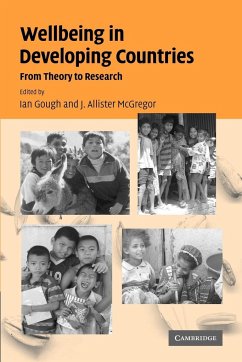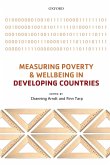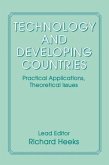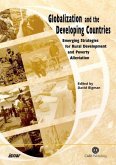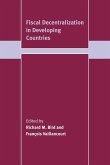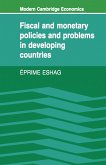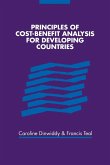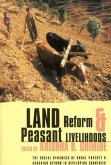Wellbeing in Developing Countries
From Theory to Research
Herausgeber: Gough, Ian; McGregor, J. Allister
Wellbeing in Developing Countries
From Theory to Research
Herausgeber: Gough, Ian; McGregor, J. Allister
- Broschiertes Buch
- Merkliste
- Auf die Merkliste
- Bewerten Bewerten
- Teilen
- Produkt teilen
- Produkterinnerung
- Produkterinnerung
Establishes a new paradigm for development centred on the idea of human wellbeing.
Andere Kunden interessierten sich auch für
![Measuring Poverty and Wellbeing in Developing Countries Measuring Poverty and Wellbeing in Developing Countries]() Measuring Poverty and Wellbeing in Developing Countries55,99 €
Measuring Poverty and Wellbeing in Developing Countries55,99 €![Technology and Developing Countries Technology and Developing Countries]() Technology and Developing Countries79,99 €
Technology and Developing Countries79,99 €![Globalization and the Developing Countries Globalization and the Developing Countries]() David BigmanGlobalization and the Developing Countries118,99 €
David BigmanGlobalization and the Developing Countries118,99 €![Fiscal Decentralization in Developing Countries Fiscal Decentralization in Developing Countries]() Fiscal Decentralization in Developing Countries61,99 €
Fiscal Decentralization in Developing Countries61,99 €![Fiscal and Monetary Policies and Problems in Developing Countries Fiscal and Monetary Policies and Problems in Developing Countries]() Eprime EshagFiscal and Monetary Policies and Problems in Developing Countries56,99 €
Eprime EshagFiscal and Monetary Policies and Problems in Developing Countries56,99 €![Principles of Cost-Benefit Analysis for Developing Countries Principles of Cost-Benefit Analysis for Developing Countries]() Caroline DinwiddyPrinciples of Cost-Benefit Analysis for Developing Countries35,99 €
Caroline DinwiddyPrinciples of Cost-Benefit Analysis for Developing Countries35,99 €![Land Reform and Peasant Livelihoods: The Social Dynamics of Rural Poverty and Agrarian Reform in Developing Countries Land Reform and Peasant Livelihoods: The Social Dynamics of Rural Poverty and Agrarian Reform in Developing Countries]() Krishna GhimireLand Reform and Peasant Livelihoods: The Social Dynamics of Rural Poverty and Agrarian Reform in Developing Countries37,99 €
Krishna GhimireLand Reform and Peasant Livelihoods: The Social Dynamics of Rural Poverty and Agrarian Reform in Developing Countries37,99 €-
-
-
Establishes a new paradigm for development centred on the idea of human wellbeing.
Hinweis: Dieser Artikel kann nur an eine deutsche Lieferadresse ausgeliefert werden.
Hinweis: Dieser Artikel kann nur an eine deutsche Lieferadresse ausgeliefert werden.
Produktdetails
- Produktdetails
- Verlag: Cambridge University Press
- Seitenzahl: 424
- Erscheinungstermin: 9. Dezember 2010
- Englisch
- Abmessung: 229mm x 152mm x 25mm
- Gewicht: 685g
- ISBN-13: 9780521180801
- ISBN-10: 0521180805
- Artikelnr.: 32301504
- Herstellerkennzeichnung
- Libri GmbH
- Europaallee 1
- 36244 Bad Hersfeld
- gpsr@libri.de
- Verlag: Cambridge University Press
- Seitenzahl: 424
- Erscheinungstermin: 9. Dezember 2010
- Englisch
- Abmessung: 229mm x 152mm x 25mm
- Gewicht: 685g
- ISBN-13: 9780521180801
- ISBN-10: 0521180805
- Artikelnr.: 32301504
- Herstellerkennzeichnung
- Libri GmbH
- Europaallee 1
- 36244 Bad Hersfeld
- gpsr@libri.de
Introduction: 1. Theorising wellbeing in international development Ian
Gough, J. Allister McGregor and Laura Camfield; Part I. Human Needs and
Human Wellbeing: 2. Conceptualising human needs and wellbeing Des Gasper;
3. Basic psychological needs: a self-determination theory perspective on
the promotion of wellness across development and cultures Richard Ryan and
Aislinn Sapp; 4. Measuring freedoms alongside wellbeing Sabina Alkire; 5.
Using security to indicate wellbeing Geoff Wood; 6. Towards a measure of
non-economic wellbeing achievement Mark McGillivray; Part II.
Resources: From Material to Cultural: 7. Wellbeing, livelihoods and
resources in social practice Sarah White and Mark Ellison; 8. Livelihoods
and resource accessing in the Andes: desencuentros in theory and practice
Tony Bebbington, Leonith Hinojosa-Valencia, Diego Munoz and Rafael Enrique
Rojas Lizarazú; 9. Poverty and exclusion, resources and relationships:
theorising the links between economic and social development James
Copestake; Part III. Quality of Life and Subjective Wellbeing: 10.
Cross-cultural quality of life assessment: approaches and experiences from
the health care field Monika Bullinger and Silke Schmidt; 11. Researching
quality of life in a developing country: lessons from the South African
case Valerie Møller; 12. The complexity of wellbeing: a life-satisfaction
conception and a domains-of-life approach Mariano Rojas; Conclusion.
Researching Wellbeing: 13. Researching wellbeing across the disciplines:
some key intellectual problems and ways forward Philippa Bevan; 14.
Researching wellbeing: from concepts to methodology J. Allister McGregor.
Gough, J. Allister McGregor and Laura Camfield; Part I. Human Needs and
Human Wellbeing: 2. Conceptualising human needs and wellbeing Des Gasper;
3. Basic psychological needs: a self-determination theory perspective on
the promotion of wellness across development and cultures Richard Ryan and
Aislinn Sapp; 4. Measuring freedoms alongside wellbeing Sabina Alkire; 5.
Using security to indicate wellbeing Geoff Wood; 6. Towards a measure of
non-economic wellbeing achievement Mark McGillivray; Part II.
Resources: From Material to Cultural: 7. Wellbeing, livelihoods and
resources in social practice Sarah White and Mark Ellison; 8. Livelihoods
and resource accessing in the Andes: desencuentros in theory and practice
Tony Bebbington, Leonith Hinojosa-Valencia, Diego Munoz and Rafael Enrique
Rojas Lizarazú; 9. Poverty and exclusion, resources and relationships:
theorising the links between economic and social development James
Copestake; Part III. Quality of Life and Subjective Wellbeing: 10.
Cross-cultural quality of life assessment: approaches and experiences from
the health care field Monika Bullinger and Silke Schmidt; 11. Researching
quality of life in a developing country: lessons from the South African
case Valerie Møller; 12. The complexity of wellbeing: a life-satisfaction
conception and a domains-of-life approach Mariano Rojas; Conclusion.
Researching Wellbeing: 13. Researching wellbeing across the disciplines:
some key intellectual problems and ways forward Philippa Bevan; 14.
Researching wellbeing: from concepts to methodology J. Allister McGregor.
Introduction: 1. Theorising wellbeing in international development Ian
Gough, J. Allister McGregor and Laura Camfield; Part I. Human Needs and
Human Wellbeing: 2. Conceptualising human needs and wellbeing Des Gasper;
3. Basic psychological needs: a self-determination theory perspective on
the promotion of wellness across development and cultures Richard Ryan and
Aislinn Sapp; 4. Measuring freedoms alongside wellbeing Sabina Alkire; 5.
Using security to indicate wellbeing Geoff Wood; 6. Towards a measure of
non-economic wellbeing achievement Mark McGillivray; Part II.
Resources: From Material to Cultural: 7. Wellbeing, livelihoods and
resources in social practice Sarah White and Mark Ellison; 8. Livelihoods
and resource accessing in the Andes: desencuentros in theory and practice
Tony Bebbington, Leonith Hinojosa-Valencia, Diego Munoz and Rafael Enrique
Rojas Lizarazú; 9. Poverty and exclusion, resources and relationships:
theorising the links between economic and social development James
Copestake; Part III. Quality of Life and Subjective Wellbeing: 10.
Cross-cultural quality of life assessment: approaches and experiences from
the health care field Monika Bullinger and Silke Schmidt; 11. Researching
quality of life in a developing country: lessons from the South African
case Valerie Møller; 12. The complexity of wellbeing: a life-satisfaction
conception and a domains-of-life approach Mariano Rojas; Conclusion.
Researching Wellbeing: 13. Researching wellbeing across the disciplines:
some key intellectual problems and ways forward Philippa Bevan; 14.
Researching wellbeing: from concepts to methodology J. Allister McGregor.
Gough, J. Allister McGregor and Laura Camfield; Part I. Human Needs and
Human Wellbeing: 2. Conceptualising human needs and wellbeing Des Gasper;
3. Basic psychological needs: a self-determination theory perspective on
the promotion of wellness across development and cultures Richard Ryan and
Aislinn Sapp; 4. Measuring freedoms alongside wellbeing Sabina Alkire; 5.
Using security to indicate wellbeing Geoff Wood; 6. Towards a measure of
non-economic wellbeing achievement Mark McGillivray; Part II.
Resources: From Material to Cultural: 7. Wellbeing, livelihoods and
resources in social practice Sarah White and Mark Ellison; 8. Livelihoods
and resource accessing in the Andes: desencuentros in theory and practice
Tony Bebbington, Leonith Hinojosa-Valencia, Diego Munoz and Rafael Enrique
Rojas Lizarazú; 9. Poverty and exclusion, resources and relationships:
theorising the links between economic and social development James
Copestake; Part III. Quality of Life and Subjective Wellbeing: 10.
Cross-cultural quality of life assessment: approaches and experiences from
the health care field Monika Bullinger and Silke Schmidt; 11. Researching
quality of life in a developing country: lessons from the South African
case Valerie Møller; 12. The complexity of wellbeing: a life-satisfaction
conception and a domains-of-life approach Mariano Rojas; Conclusion.
Researching Wellbeing: 13. Researching wellbeing across the disciplines:
some key intellectual problems and ways forward Philippa Bevan; 14.
Researching wellbeing: from concepts to methodology J. Allister McGregor.

